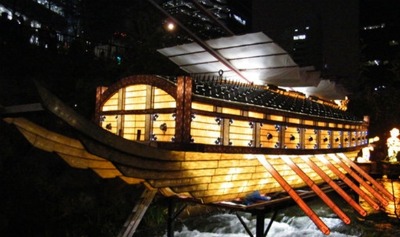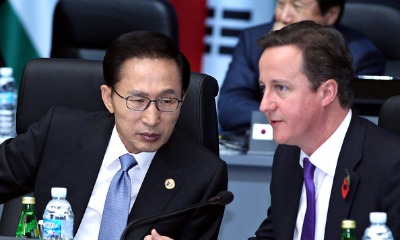Problem Definition - What is the G20?
By Joon Pyo Hong
In November, the leaders of the G20 gathered in Seoul, South Korea, for the fifth G20 Summit. The Seoul G20 Summit marks the launch of a new global economic architecture which will allow leaders to build a platform for longer-term economic cooperation, ensuring sustained and balanced growth for the global economy in the years ahead. “Shared Growth Beyond Crisis,” the motto for this year’s summit, encapsulates this objective.
The first G20 Summit took place on November 15, 2008, where the leaders of G20 member states convened for the first time in Washington D.C. amidst the recent global financial crisis. The outlook for major economies had deteriorated rapidly in the wake of the fall of Lehman Brothers in September 2008, and the economic shocks that first hit the world’s largest economies quickly spilled over to smaller markets, underscoring the global integration of national financial systems. With the sudden reversal of capital flow and a collapse in trade finance, even emerging markets which had relatively strong fundamentals before the crisis found themselves on the brink of collapse.
The Washington Summit marked the first meeting of the heads of state of all the G20 nations. The leaders of advanced and emerging countries came together in an effort to stabilize the global economy and to discuss how to prevent future crises. They made a commitment to undertake concerted policy coordination to restore global growth and to limit the contagiousness of economic shocks across borders. More immediately, they decided to use fiscal measures and continue monetary support policies to stimulate domestic demand. They also agreed on key principles of financial and regulatory reform and the importance of rejecting protectionism.
Due in large part to the G20’s unprecedented policy coordination, the world averted another “Great Depression,” with the beginnings of resumed growth and recovery taking root around the time of the third G20 Summit held in Pittsburgh in September 2009. At that point, the G20 Leaders recognized the importance not only of responding effectively to current economic challenges, but also of laying the foundation for a durable recovery and a more resilient global economy. To this end, the Leaders launched the Framework for Strong, Sustainable and Balanced Growth – a pact that commits the G20 countries to work together to coordinate national policies – recognizing that through collective and more transparent policy coordination, they can achieve far better and more ambitious outcomes than through the design and implementation of national policies in isolation, however carefully done. The G20 Leaders also reaffirmed their resolve to reform the financial regulatory system and the global financial architecture, and to address broader issues related to climate financing, energy security, poverty reduction, employment and trade.
The recent financial crisis vividly illustrated how closely our national economies are integrated on the global scale. The members of the G20 recognize that, in such a closely interconnected world, the national interest of each country is often best served by the recognition of shared global interest.
The top priority for the G20 remains as following through on previous commitments within the established timeframe, and as such, the agenda for this year’s summit includes: the framework for strong, sustainable, and balanced economic growth, strengthening the international financial regulatory system, modernizing international financial institutions, and meeting challenges in trade and energy security. South Korea, as the G20 chair for the 2010 summit, brought forth new issues to the G20 that are close closely tied to the G20’s main agenda. They are the global financial safety net system, development, and the Seoul G20 Business Summit.
Cultural Exploration - Not All About Business
By Yoo Hee Kang
The G20 Seoul Summit Committee prepared various kinds of cultural activities and performances for all visitors during the Summit period. Some of the events were prepared and targeted specifically for the G20 participants such as the leaders of all twenty countries, their spouses, CEOs of the Business Summit and media reporters. Most cultural opportunities, however, were open to all who came to Korea while the G20 summit took place.
Though occupied with discussions and conferences regarding the challenges of this year’s second G20 summit, the leaders of G20 were still invited to enjoy Korea’s cultural foods and traditional arts at their leisure. Korean-style dinner and performances by actresses were prepared not only to leave a profound impression on the visitors, but also to serve as an aside from all the exhausting debates and decision making. To name a few, Korea’s traditional folksong “Arirang” and ballet and jazz performances took place, along with other contemporary music and dance programs.

The spouses of G20 leaders were especially welcomed by Korea’s first lady, Yoon-ok Kim, who prepared several cultural events for a total of thirteen spouses. Kim invited the spouses to a UNESCO designated site, Changdeok Palace, where an outdoor fashion show featuring hanbok, Korea’s traditional costume, was held. All 24 costumes were made by Korea’s top designers. The spouses also had the privilege to see the beautiful garden of Changdeok Palace. Wrapping up this visit, the spouses experienced Korea’s traditional underfloor heating system, ondol. Following right after, a Korean luncheon awaited the spouses. This luncheon was especially unique in that the visitors were surrounded by traditional furniture and interior decoration during the meal. These culture-experiencing aspects of the visit were prepared to enhance their understanding of the Korean lifestyle.
For all tourists during the G20 Seoul Summit period, Deoksu Palace and Kyungbok Palace operated during late hours. This fact is significant in that both palaces have never been open to visitors at night since their creation. Also, the Cheong Gae Cheon Lantern Festival was held from November 5 to 14 to commemorate the G20 Seoul Summit. The lanterns portraying Korean traditions and signature models of other countries lit up the Cheong Gae Cheon stream brightly. A lantern specially made to represent the G20 Seoul Summit was also among the countless unique lanterns.
Among thousands of tourists, three tourists from Hong Kong went on a tour bus trip to Korea’s National Gugak Center and the Music Fountain which was also a temporarily available special event featuring a fountain dancing to music. The interviewee Andrew Cheong, an electrical engineer of a power company dealing with construction and maintenance of electrical power lines, says that he came to Seoul for sightseeing.
Impressed not only by Korea’s hospitality and efforts to run the G20 Summit smoothly but also by the efforts of citizen volunteers to help out all tourists, Andrew and his family members were very satisfied with the trip. Free tickets for the subway, tour bus, and various performances were also convenient. Also, the fact that the volunteers were literally everywhere during their travel, helping out with directions, made touring Seoul much easier than expected.
Cheong says that Korean traditional performing arts, Ganggangsullae and Pansori performed at the National Gugak Center were both fresh and delicate. Cheong enjoyed the different articulations represented in Ganggangsullae. The Cheong family says that the performances were very well organized and prepared, and that they would come back to Korea in the future to experience more of the culture. Other tourists had similar opportunities like the Cheong family. The Seoul G20 Committee’s hope that all visitors had memorable and safe experiences in Korea seems to have come true for most visitors. So, did Korea leave a good impression on all visitors? The future will tell the truth.
The Outcome - What the Summit Achieved
By Hojae Jin
The Summit ended without any surprises, but did have some significant outcomes for each of the countries that participated, and the global economy as a whole.
Korea, as the host of the G20, has achieved a considerable amount of economic gain through this global event. President Lee Myung-bak announced that the economical gain Korea would get from the G20 Seoul Summit would be about $392.2 billion, along with the creation of 2.4 million additional jobs.

Being the first non-G7 country to host the G20 Summit, Korea has attempted to lead the summit in a way that would best fulfill the motto of this Summit, “Shared Growth Beyond Crisis.”. Korea, wanting to bridge the gap between developing and advanced economies, introduced two new items: the establishment of stronger global financial safety nets and the creation of a G20 multi-year action plan to support sustainable growth and poverty reduction in the developing world. These new items are evaluated as the ways of paving the way to a healthy global economy.
The Summit ended with the Seoul Summit Declaration in which the leaders have agreed to provide maximum cooperation in supporting and stabilizing the global economy. The Seoul Action Plan was delivered as well, addressing most of the specific, concrete economic agreements that were made in the Summit.
There were five big policy areas that were addressed in the Seoul Action Plan: Monetary and Exchange Rate Policies, Trade and Development Policies, Fiscal Policies, Financial Reforms, and Structural Reforms.
For the monetary and exchange rate policies, the leaders reaffirmed the importance of the central banks’ commitment to price stability and to recovery and sustainable growth. Therefore, a more market-determined exchange rate system and enhanced exchange rate flexibility would be sought to reflect underlying economic fundamentals and refrain from competitive devaluation of currencies. International monetary organizations such as the International Monetary Fund (IMF) would be called upon to increase their efforts in promoting this stable and well-functioning economy.
Regarding trade and development policies, the crucial role of free trade in the global recovery was again acknowledged. The leaders agreed to refrain from introducing, and oppose protectionist trade actions in all forms and recognize the importance of a prompt conclusion of the Doha negotiations. Importantly, the leaders decided to take concrete actions to increase the financial and technical support to low-income countries (LIC’s), including fulfilling the Official Development Assistance (ODA) commitments by advanced countries.
With regards to the fiscal policies, advanced economies agreed to formulate and implement clear, credible, ambitious, and growth-friendly medium-term fiscal consolidation plans in line with the Toronto commitment, differentiated according to national circumstances.
For the financial reforms, a commitment towards taking actions at the national and international level to raise standards, ensuring the implementation of global standards developed to date, were made. In particular, the leaders promised to fully implement the new bank capital and liquidity standards and address too-big-to-fail problems.
The structural reforms were made in order to boost and sustain global demand, foster job creation, contribute to global rebalancing, and increase the growth potential. In order to do that the OECD, IMF, World Bank, ILO and other international organizations are to lend their expertise.
Also, the enhanced Mutual Assessment Process (MAP) was achieved to promote external sustainability. The leaders agreed to strengthen multilateral cooperation to promote external sustainability and pursue the full range of policies conducive to reducing excessive imbalances and maintaining current account imbalances at sustainable levels.
A modernized IMF that better reflects the changes in the world economy through greater representation of dynamic emerging markets and developing countries would be promoted as well.
These agreements made are expected and hoped “to help to further strengthen the global economy, accelerate job creation, ensure more stable financial markets, narrow the development gap and promote broadly shared growth beyond crisis,” as stated in the concluding words of the Seoul Summit Declaration.

